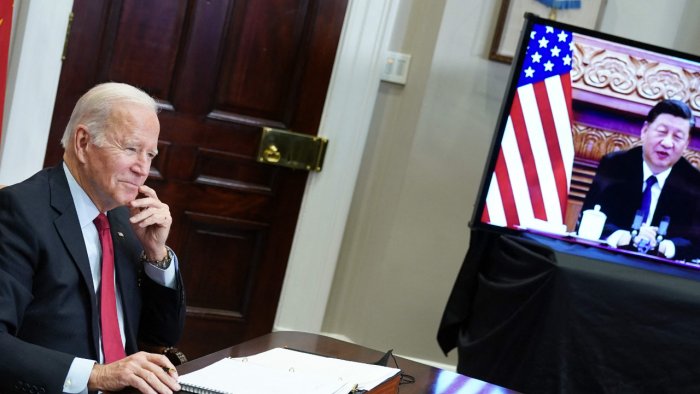Tokyo, 16 November, /AJMEDIA/
U.S. President Joe Biden met with his Chinese counterpart Xi Jinping virtually on Monday as part of efforts to manage the intensifying rivalry between their nations over issues ranging from trade to human rights and Taiwan.
The meeting is being closely watched to see whether it may lead to de-escalation in tensions, but the White House has tamped down expectations of any “major deliverables” coming out of the two leaders’ first bilateral meeting since Biden took office in January.
At the outset of the talks, Biden said their responsibility as leaders of the world’s two largest economies is to “ensure that the competition between our countries does not veer into conflict,” The Associated Press reported.
Xi, for his part, said the United States and China should respect each other, co-exist peacefully and cooperate, according to Chinese state-run media.
With Xi not having left China at all during the coronavirus pandemic, the online meeting brings the two leaders “as close to face-to-face as technology allows to see one another” and provides an opportunity to “spend a significant amount of time going over the full agenda,” Biden’s National Security Adviser Jake Sullivan said in late October.
A senior Biden administration official said during a briefing just ahead of the summit that the meeting is expected to run several hours and the leaders will discuss ways to manage the competition, such as by keeping communication channels open and building “commonsense guardrails” to avoid any misunderstanding and miscalculation.
The two countries have clashed over a range of issues, including Beijing’s alleged human rights abuses against the Muslim Uyghur minority in its far-western Xinjiang region, the crackdown on Hong Kong democracy, and the situations in the East and South China seas, where China has been increasingly assertive.
The Biden administration has also criticized China’s economic policies and practices that have resulted in it gaining an unfair competitive advantage, such as through its extensive use of industrial subsidies.
Most recently, tensions have grown over Taiwan as China is stepping up its military pressure on the self-ruled democratic island which Beijing considers a renegade province awaiting reunification, by force if necessary.
China and Taiwan have been governed separately since they split in 1949 as the result of a civil war. Relations have deteriorated since independence-leaning Tsai Ing-wen became Taiwan’s president in 2016.
After switching its diplomatic recognition from Taipei to Beijing in 1979, Washington has committed to the one-China policy, which recognizes Beijing as the “sole legal government of China” but allows unofficial ties with Taiwan and assistance to the island in maintaining a sufficient self-defense capability.
Beijing has demanded the United States not interfere in China’s “internal affairs,” referring to issues such as Taiwan, Hong Kong and Xinjiang.
It has also warned the United States, which has been forging closer ties with Taipei, to observe the one-China policy and stop sending the “wrong signals” to Taiwan independence forces if it wants to “safeguard peace across the Taiwan Strait,” according to the state-run Xinhua News Agency.
Taiwan is seen as a potential military flashpoint that could draw the United States into conflict with China, which would also pose serious security challenges to Japan, a close U.S. ally. Taiwan is located just 170 kilometers away from the Japanese-controlled Senkaku Islands in the East China Sea, claimed by China.
As security flashpoints emerge, the two countries have been aware of the need to ensure competition does not veer into conflict, with Biden and Xi discussing the issue in their most recent phone call in September.
“We are seeking a steady state of affairs between our two countries where we compete vigorously, where we push back on the many areas of concern we have with the PRC, and where we coordinate on issues where our interests align,” the Biden administration official said, using the acronym for the People’s Republic of China.
“The Biden administration is not trying to change China through bilateral engagement. We don’t think that’s realistic,” she said, adding, “Rather, we are trying to shape the international environment in a way that is favorable to us and our allies and partners.”

